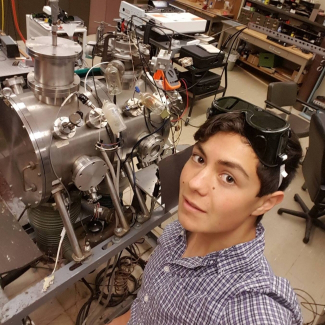JILA graduate student Aaron Young, a researcher in JILA Fellow and NIST Physicist Adam Kaufman’s laboratory has been awarded a 2022 University of Chicago Quantum Creators Prize. The prize is part of the Chicago Quantum Exchange, one of the largest organizations celebrating quantum research and computing in the U.S. As Young explained: “This award is relatively new, this is only the second year it's been around, but I think it does a good job of providing some visibility to junior people in the field - particularly to people outside the academic community like those in industry or in government.” To promote early career research and diversity within the field of quantum science, award winners receive an honorarium of $500, a prize certificate, and reimbursed travel to the 2022 Chicago Quantum Summit.
Working within the Kaufman laboratory, Young focuses on building new systems to study the quantum dynamics of alkaline-earth atoms, like ytterbium. “This award recognized my contributions to the strontium tweezer array experiment in Adam's lab, including helping to build the experiment, studying algorithms that take advantage of quantum walks of many atoms, as well as work using the same atoms for precision measurements of time,” Young said. “It's worth saying that this experiment is the result of the collective effort of several fantastic researchers that I've had the pleasure of working with in my Ph.D. Postdocs Matthew Norcia and Nathan Schine, as well as Ph.D. student William Eckner, deserve particular mention.” Young was excited to see that the award also recognized the importance of research within quantum science, no matter how specific it seemed. “Of course, the stuff we do is always interesting to us, but the nature of scientific research is that you have to dive deep into often relatively niche problems to make progress,” added Young. “When you emerge from the other side it's hard to know if you have made real progress, or if you have some sort of scientific Stockholm syndrome. That being the case it's always very encouraging to hear that other people are also interested in these problems.”
Young was also excited to travel to the Chicago Quantum Exchange to speak on his research with other researchers, as well as non-experts. “Attending the quantum summit and presenting to a community that typically doesn't attend student talks opened the door to a lot of interesting conversations that could lead the way to productive research programs in the future.”
When speaking about Young’s work in the laboratory, Kaufman stated: “Aaron has had an exceptional Ph.D., building up an experiment starting from an empty room in 2017, and later being the leading force on a number of impactful publications from the group. He is highly deserving of a prize like this, and we are grateful to the Chicago Quantum Exchange for hosting this event for the community.”
Written by Kenna Hughes-Castleberry, JILA Science Communicator



 The Physics Frontiers Centers (PFC) program supports university-based centers and institutes where the collective efforts of a larger group of individuals can enable transformational advances in the most promising research areas. The program is designed to foster major breakthroughs at the intellectual frontiers of physics by providing needed resources such as combinations of talents, skills, disciplines, and/or specialized infrastructure, not usually available to individual investigators or small groups, in an environment in which the collective efforts of the larger group can be shown to be seminal to promoting significant progress in the science and the education of students. PFCs also include creative, substantive activities aimed at enhancing education, broadening participation of traditionally underrepresented groups, and outreach to the scientific community and general public.
The Physics Frontiers Centers (PFC) program supports university-based centers and institutes where the collective efforts of a larger group of individuals can enable transformational advances in the most promising research areas. The program is designed to foster major breakthroughs at the intellectual frontiers of physics by providing needed resources such as combinations of talents, skills, disciplines, and/or specialized infrastructure, not usually available to individual investigators or small groups, in an environment in which the collective efforts of the larger group can be shown to be seminal to promoting significant progress in the science and the education of students. PFCs also include creative, substantive activities aimed at enhancing education, broadening participation of traditionally underrepresented groups, and outreach to the scientific community and general public.